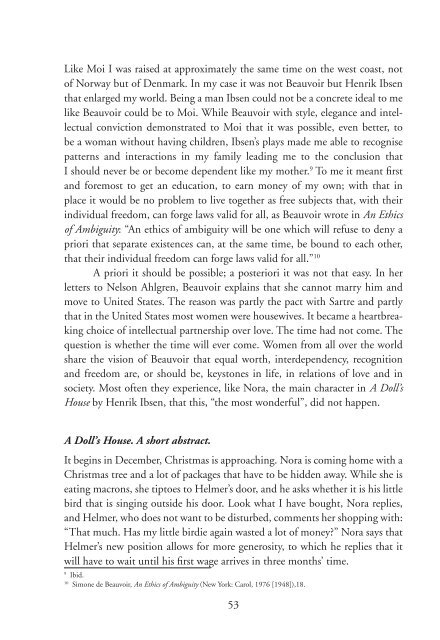Teaching Subjectivity. Travelling Selves for Feminist ... - MailChimp
Teaching Subjectivity. Travelling Selves for Feminist ... - MailChimp
Teaching Subjectivity. Travelling Selves for Feminist ... - MailChimp
Create successful ePaper yourself
Turn your PDF publications into a flip-book with our unique Google optimized e-Paper software.
Like Moi I was raised at approximately the same time on the west coast, not<br />
of Norway but of Denmark. In my case it was not Beauvoir but Henrik Ibsen<br />
that enlarged my world. Being a man Ibsen could not be a concrete ideal to me<br />
like Beauvoir could be to Moi. While Beauvoir with style, elegance and intellectual<br />
conviction demonstrated to Moi that it was possible, even better, to<br />
be a woman without having children, Ibsen’s plays made me able to recognise<br />
patterns and interactions in my family leading me to the conclusion that<br />
I should never be or become dependent like my mother. 9 To me it meant first<br />
and <strong>for</strong>emost to get an education, to earn money of my own; with that in<br />
place it would be no problem to live together as free subjects that, with their<br />
individual freedom, can <strong>for</strong>ge laws valid <strong>for</strong> all, as Beauvoir wrote in An Ethics<br />
of Ambiguity: “An ethics of ambiguity will be one which will refuse to deny a<br />
priori that separate existences can, at the same time, be bound to each other,<br />
that their individual freedom can <strong>for</strong>ge laws valid <strong>for</strong> all.” 10<br />
A priori it should be possible; a posteriori it was not that easy. In her<br />
letters to Nelson Ahlgren, Beauvoir explains that she cannot marry him and<br />
move to United States. The reason was partly the pact with Sartre and partly<br />
that in the United States most women were housewives. It became a heartbreaking<br />
choice of intellectual partnership over love. The time had not come. The<br />
question is whether the time will ever come. Women from all over the world<br />
share the vision of Beauvoir that equal worth, interdependency, recognition<br />
and freedom are, or should be, keystones in life, in relations of love and in<br />
society. Most often they experience, like Nora, the main character in A Doll’s<br />
House by Henrik Ibsen, that this, “the most wonderful”, did not happen.<br />
A Doll’s House. A short abstract.<br />
It begins in December, Christmas is approaching. Nora is coming home with a<br />
Christmas tree and a lot of packages that have to be hidden away. While she is<br />
eating macrons, she tiptoes to Helmer’s door, and he asks whether it is his little<br />
bird that is singing outside his door. Look what I have bought, Nora replies,<br />
and Helmer, who does not want to be disturbed, comments her shopping with:<br />
“That much. Has my little birdie again wasted a lot of money?” Nora says that<br />
Helmer’s new position allows <strong>for</strong> more generosity, to which he replies that it<br />
will have to wait until his first wage arrives in three months’ time.<br />
9<br />
Ibid.<br />
10<br />
Simone de Beauvoir, An Ethics of Ambiguity (New York: Carol, 1976 [1948]),18.<br />
53

















